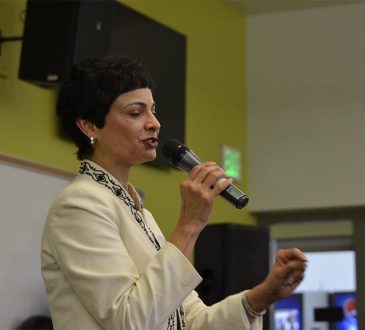HR’s role in cultivating a culture of gratitude in the workplace – and why you’d want to

When organisations analyse their culture and determine their values ‘gratitude’ isn’t a trait that is likely to appear, and yet it is increasingly evidenced as being critical for personal well-being and organisational success. In a working world that’s constantly changing and throwing up obstacles and challenges, the ability for leaders and employees to withstand stress and adversity and be resilient is critical. HR leaders play a key role in shaping a gratitude based culture.
Why it matters
Beyond Blue’s State of Workplace Mental Health in Australia (2017) report painted a bleak picture of the state of Australian workplaces. One in five Australians (21%) took time off work in the prior 12 months because they felt stressed, anxious, depressed or mentally unhealthy; and this statistic was more than twice as high (46%) amongst those who considered their workplace mentally unhealthy.
They further found the substantial impact this has on workplace productivity and effectiveness. Consequently, there is now growing recognition of the importance of creating happy, healthy and safe workplaces.
Research from Berkley University’s Greater Good Science Centre found that one of the keys to well-being is practising gratitude. Gratitude has been found to increase happiness levels, positive emotions, improve relationships, increase a person’s resilience to stressful events, as well as reduce the risk of depression.
Getting real
It’s important for HR practitioners to understand what practising gratitude looks like in the workplace. It’s not about getting employees to ignore their emotions or feelings of stress, sadness or hurt. Rather, it’s about equipping leaders and employees with the strategies and mechanisms to best cope with challenges and change. So rather than letting a situation over-whelm or consume their every waking thought they can progress through it. This takes deliberate focus and effort.
Psychologist and Author, Martin Seligman’s work changed much of the conventional thinking about happiness, optimism and treating depression. His research shows that optimism is a trait that can be learned.
He said: “Optimistic people generally feel that good things will last a long time and will have a beneficial effect on everything they do. And they think that bad things are isolated: They won’t last too long and won’t affect other parts of life”.
For example, in his work with the US Army helping returning soldiers deal with the effects of Post-Traumatic Stress Disorder (PTSD), he has demonstrated that providing resilience and positive psychology training has lowered the rates of PTSD, substance abuse and depression. A key element in doing this is cultivating a daily gratitude practice, which over time helps to rewire the brain. It is a simple practice whereby at the end of each day a person writes down three things that went well and why.
Adapt to your workplace
HR practitioners can work with leaders to help them understand the importance of these simple techniques and to adapt to their workplace. One such idea is to build in reflective activities as part of team meetings. These activities enable the team to focus on where they have made progress and why. People want to work on activities that matter and to see they have made progress.
As well, the team members can be encouraged to take a moment at the end of each day to reflect on their day and write down what went well and why. This doesn’t have to be a massive achievement. It can be as simple as: ‘I had a great client meeting’, ‘The trains ran on time today’, or ‘I completed a key deliverable in a project’.
Relationships matter
As part of this process, HR should encourage leaders to cultivate an environment where relationships matter. This means leaders see the devotion of time and attention to relationships with colleagues and team members as important. In the ‘busyness’ of a working day it can be easier for leaders to deprioritise connections and relationships and to put tasks first. Study after study has demonstrated that people who are happy and grateful have strong connections to the community, colleagues and good friends. In short, they make connections and pay attention to keeping those connections healthy. In the working environment this also includes establishing core rituals in the team where team members are encouraged to focus on what they can do for others. When a person does something nice for someone else it makes them feel good; helping them realise the positive forces they have in their life and being grateful for that.
Practising gratitude isn’t a one-off activity. For best results, it’s something that leaders and team members focus on each day, and that HR practitioners and leaders demonstrate through practice and advice as important too.
Have you read?
Best Websites For CEOs, Senior Executives, And entrepreneurs.
Top 100 Best Executive Search Firms And Consultants That Dominate The Recruiting Business.
Meet The Richest Families In The World.
Taiwan’s Rich List: Richest Taiwanese Billionaires.
Add CEOWORLD magazine to your Google News feed.
Follow CEOWORLD magazine headlines on: Google News, LinkedIn, Twitter, and Facebook.
This report/news/ranking/statistics has been prepared only for general guidance on matters of interest and does not constitute professional advice. You should not act upon the information contained in this publication without obtaining specific professional advice. No representation or warranty (express or implied) is given as to the accuracy or completeness of the information contained in this publication, and, to the extent permitted by law, CEOWORLD magazine does not accept or assume any liability, responsibility or duty of care for any consequences of you or anyone else acting, or refraining to act, in reliance on the information contained in this publication or for any decision based on it.
Copyright 2024 The CEOWORLD magazine. All rights reserved. This material (and any extract from it) must not be copied, redistributed or placed on any website, without CEOWORLD magazine' prior written consent. For media queries, please contact: info@ceoworld.biz
SUBSCRIBE NEWSLETTER








